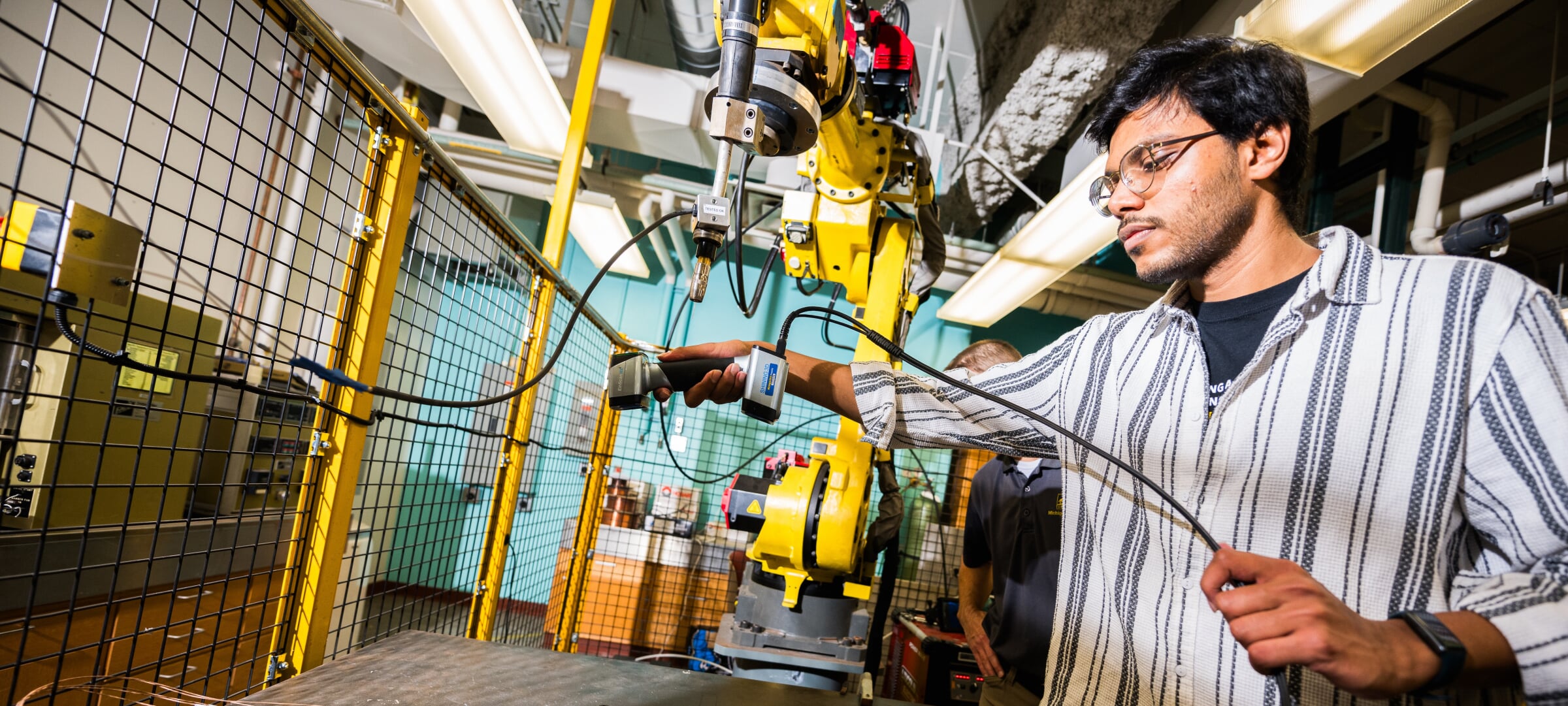Michigan Tech's advanced degree programs in Manufacturing Engineering meet industry needs and further your expertise in the field. Be equipped to continue accelerating the growth of innovative technologies and be in demand.
Both our master's and PhD degrees are applicable across traditional engineering disciplines, including material science, mechanical, electrical, robotic, biomedical, and chemical engineering. Advance your skillset in processes for forming, joining, casting, molding, producing composites, micromachining, and additive methodologies.
Being competitive in the market is crucial for manufacturers. No matter the industry, companies share the end goal of producing a better product at a lower cost. The industry needs professionals with expertise in smart manufacturing, modeling, simulation, sustainability, additive manufacturing, and advanced materials—and that leads to high demand and high-paying careers.
Our programs focus on all-important digital technologies as well as physical equipment needs. Advanced manufacturing relies heavily computing technologies for artificial intelligence, machine learning, machine vision, data analytics, and other innovations that support Industry 4.0.
Learn in our Machine Shop, the base for several of our manufacturing courses. A resource for faculty research, project fabrication, and testing, the facility is also a hub for student projects, including PhD research.
Master's Program
Graduates with the master’s in Manufacturing Engineering will be prepared to earn SME Certification, the industry standard for assessing and acknowledging a candidate's professional knowledge, skills, competencies, and abilities.
Our master's in manufacturing engineering degree program applies to more than mechanical or manufacturing engineers.
Students with biomedical, electrical, chemical, robotics, or materials science and engineering degrees will also find that it levels up their skills and hiring potential. You can acquire knowledge and skills in print reading, CAD modeling software, and manufacturing processes.
PhD Program
The Manufacturing Engineering PhD program emphasizes research of the most viable and efficient processes used during fabrication, shaping, machining, and assembly and provide an opportunity for students with an MS degree to further their domain knowledge and expertise in the field. Students pursuing their PhD can earn the MS in Manufacturing Engineering along the way.
Created in response to industry demand and rapidly evolving technologies, the PhD degree program is applicable across traditional engineering disciplines including material science, mechanical, electrical, robotic, biomedical, and chemical engineering in order to make advancements in processes for forming, joining, casting, molding, producing composites, micromachining, and additive methodologies.
High Demand Professions
It’s predicted that 35,600 new jobs in manufacturing engineering will need to be filled by 2029. The 1.36 percent annual increase in job demand over the next few years means more faculty holding PhD degrees will be needed to prepare students for their careers.
The job demand increase also translates to a need for research engineers, with 14 percent growth expected in manufacturing engineering jobs through 2030.
Delivery Options
Receive the same outstanding Michigan Tech education online or on-campus. Choose the education delivery option that is best for you:
- Online: MS
- Accelerated: MS
- On-Campus: MS, PhD
-
200undergraduate MET program students
-
10faculty members
-
$27Mfunding by NSF FY23 for Future Manufacturing
MS Course Schedule
We offer flexible delivery options to match your work-life balance.
This 30-credit degree is designed for the traditional student or working professional to align course projects to applications in their place of work.
- Courses are offered in a variety of formats.
- Courses include application-based learning activities to be performed at the workplace.
- Group projects accommodate students who are not currently in roles that accommodate a workplace project.
All required courses are available through remote instruction, whether synchronous or asynchronous. Check the schedule of online courses.
Take 16 credits from this list. MEEM 6010 Engineering Research Communications may be taken instead of MFGE 5010 (formerly listed as MEEM 5010).
This course schedule is not an official list of degree requirements. Students should refer to their official degree audit for requirements.
PhD Course Schedule
Courses allow for specialization in Industry 4.0 topics like additive manufacturing, manufacturing systems and operations, product tooling, assembly engineering, quality engineering, and advanced materials and manufacturing processes.
There are 16 hours of core courses for students with a bachelor’s degree that can be taken as electives by students with a master’s degree with approval from an advisor. There are 12 credits minimum of dissertation research or practicum credit required. Maximum of 12 credits may be at the 3000 or 4000 level. See page 10 of the Senate Proposal for core courses, electives, and dissertation research credits required.
Manufacturing Emphasis Area Electives
The remaining courses are subject to advisor approval, with the limitation of a maximum of 12 credits at the 3000-4000 level. Example courses are shown below. Other courses/areas may be suitable as well.
Additive Manufacturing
Manufacturing Systems and Operations
Advanced Materials and Manufacturing Processes
Quality Engineering
Degree Options
The thesis option requires 20 course credits plus 10 research credits. The report option requires 24 course credits plus 6 research credits. The coursework option requires 30 course credits. See Degree Requirements for the Master of Science.

